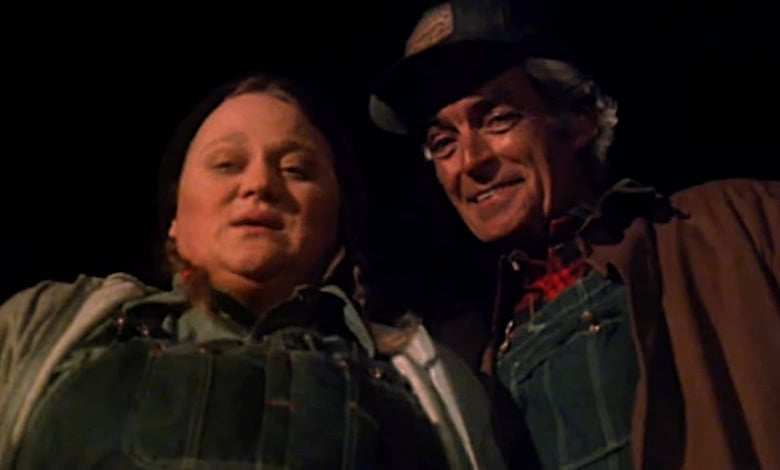
Both Roger Ebert and Joe Bob Briggs raved about Kevin Conner’s “Motel Hotel” (1980), which is why it went on my radar at a young age.
It wasn’t the only time that Ebert, the Pulitzer Prize-winning movie critic and one half of the most famous movie critic duo ever, and Briggs, host of various drive-in movie specials for decades, agreed on something.
Yet, one can’t help but be curious when two highly accomplished and always enjoyable film authorities both circled their wagons around a movie with the infamous movie poster tagline, “It takes all kind of critters to make Farmer Vincent’s fritters.”
Farmer Vincent is played by Rory Calhoun and Nancy Pearsons plays his sister, Ida. They run the Motel Hello, a rundown but serviceable little place out in the middle of nowhere. When we meet them, they seem stuck in the life they live, as the childlike Ida has fallen asleep wearing pajamas while watching a fire-and-brimstone preacher on television and Farmer Vincent watches the road, patiently, with a tinge of loneliness and anxiety.
A telling early detail that surfaces: Farmer Vincent’s meats “are only distributed within a 100-mile radius.”
Conner’s film is self-aware of how outrageous this all is, but he and the cast play it straight. The film has it both ways, emerging as a clever dark comedy and a real-deal challenge to the gag reflex.
FAST FACT: Conner recalled his initial disgust with the very first page of the “Motel Hell” script in a 2023 interview, including a reference to a sex toy in plain sight. The studio agreed with his critiques, rewriting the project to emphasize the dark humor aspects of the finished product.
Another major asset is Lance Rubin’s surprisingly beautiful, rich score and the skillful cinematography by Thomas Del Ruth, the filmmaking veteran who got his start as an assistant Director of Photography on films like “The Sand Pebbles” (1966) and “Planet of the Apes” (1968), then later filmed movies like this, “The Breakfast Club” (1985) and Stand by Me” (1986).
Rubin and Del Ruth give this a classy sheen that immediately counters expectations.
Conner followed “Motel Hell” with the interesting, Japan-set ghost story, “The House Where Evil Dwells” (1982), a far less successful film, and mostly worked non-stop for decades afterward making TV movies.
“Motel Hell” feels more like a response to Tobe Hooper’s “The Texas Chainsaw Massacre” (1974) than a rip-off. It manages the tricky feat of being gross and shocking but avoids explicit gore and mostly implied violence. Its best scenes are as funny as they are grotesque.
In addition to a wild premise and the sheer joy everyone seems to be having in playing their roles, you also get a cameo from Wolfman Jack, in a funny sequence involving a swinger couple with no idea of the danger they’re in.
There’s also the horrific reveal of Farmer Vincent’s “secret garden” and, not to be outdone, a climactic chainsaw battle that is as suspenseful as it is burly and thrilling in its staging. I’m unsure if it’s a better chainsaw battle than the one in the climax of “The Texas Chainsaw Massacre 2” (1986) but I’m still giving Farmer Vincent the win in that category.
Another nice aspect of “Motel Hell” is that there’s no sequel, as the wrap-up scenes give this a proper conclusion without forcing a follow-up.
Every time I revisit “Motel Hell,” I’m always struck by how funny and atmospheric it is, in addition to how its premise is told like a scary cautionary tale about trusting seemingly benevolent public figures and not just an excuse for cheap thrills.
Whether viewed as a farce about how old timers and outsiders view one another or just taken straight as a laugh and gasp fest, “Motel Hell” just gets better with each viewing. Happy 45th birthday, Farmer Vincent!
